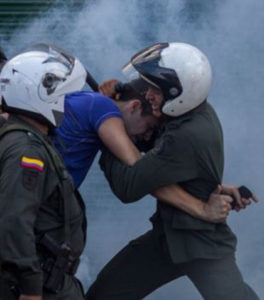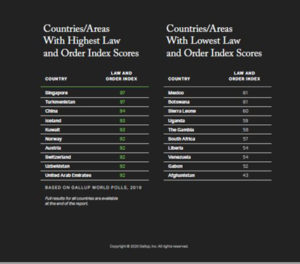A third of humanity feels unsafe – Gallup report
Safety and security for citizens is unsurprisingly lowest in countries beset by conflict and with high numbers of displaced persons, according to the latest Gallup Global Law and Order report.
The report found almost seven in ten people (69 per cent) worldwide said in 2019 that they feel safe walking alone at night where they live and have confidence in their local police.
 About one in eight (12 per cent) said they had property stolen from them or another household member in the past year, and 6 per cent said they were assaulted or mugged. These numbers remained largely unchanged from 2018, the report said.
About one in eight (12 per cent) said they had property stolen from them or another household member in the past year, and 6 per cent said they were assaulted or mugged. These numbers remained largely unchanged from 2018, the report said.
Gallup compiles the “positive” responses to these four questions about safety, police, theft and attacks into a Law and Order Index score for each country.
The questions are based around the UN’s Sustainable Development Goal 16 which aims to “promote peaceful and inclusive societies for sustainable development, provide access to justice for all, and build effective, accountable and inclusive institutions at all levels”.
The higher the score, the higher the proportion of the population that reports feeling safe. The index score for the world in 2019 was 82 out of a possible 100 – basically unchanged from scores since 2017. Ninety countries and areas posted index scores lower than the global average.
 Countries scoring highest and lowest on the index were also largely the same as in recent years. Scores worldwide ranged from a high of 97 in Singapore – which tops the list nearly every year – to a low of 43 in Afghanistan, which ranked the lowest in the world for the second consecutive year.
Countries scoring highest and lowest on the index were also largely the same as in recent years. Scores worldwide ranged from a high of 97 in Singapore – which tops the list nearly every year – to a low of 43 in Afghanistan, which ranked the lowest in the world for the second consecutive year.
As low as Afghanistan’s score was in 2019, it represents an improvement from the record-low score of 38 the previous year, which was one of the deadliest years for Afghan civilians in recent record.
Afghans did not feel any safer (12 per cent) walking alone at night, nor were they any more confident in their police (24 per cent) in 2019 than in 2018. In fact, no other country posted worse scores on these two measures.
However, the country’s overall score improved because Afghans were less likely to have been victims of property crime (40 per cent) in 2019, or to have been assaulted or mugged (22 per cent), than they had been the previous year, when 50 per cent had money or property stolen and 29 per cent had been assaulted, the Gallup report said.
Australia scored 82 to on the 100 index of Law and Order.
As in previous years, people in Latin America and the Caribbean were the least likely among all global regions to feel secure in their communities. But in 2019, the region scored a 66 on Gallup’s Law and Order Index – the region’s highest score in recent years – placing it on par with sub-Saharan Africa at 67.
In most regions, the 2019 scores on the Law and Order Index were relatively within the same range as the past several years. However, the score in the region of Latin America and the Caribbean continued to climb, as did the score in East Asia. Overall, in most regions, scores for individual countries also tended to change very little.
Higher security scores in a handful of countries in Latin America and the Caribbean helped raise the region’s overall score in 2019.
Index scores improved measurably in Bolivia, Brazil, El Salvador, Nicaragua, Uruguay and Venezuela. In these countries, more residents felt safe walking alone at night in their communities and expressed more faith in their local police than they had in several years.
Read the full report: https://www.gallup.com/analytics/322247/gallup-global-law-and-order-report-2020.aspx












